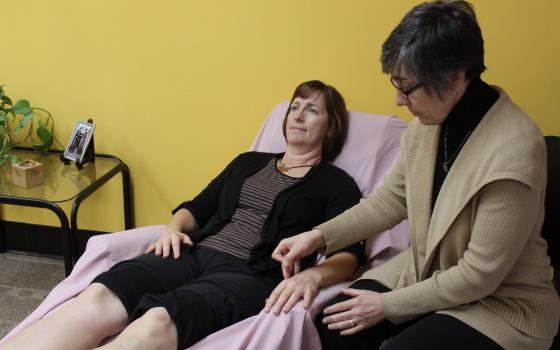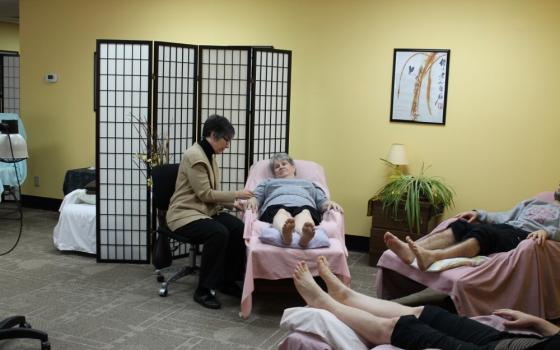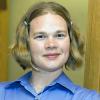Sr. Eileen McKenzie first found herself drawn to biology and studying life in high school.
"It's tending to this miracle of the human body and spirit," she said.
She went to nursing school and worked as a nurse in California before sensing a call to religious life and becoming a Lay Mission Helper. As a Lay Mission Helper, she spent three and a half years in Cameroon, learning about different cultural aspects of health care and how family, relationships and beliefs can play a role.
"All my previous experience and American values were about high intervention and high tech," she said.
She then returned to the United States to discern a call to religious life and has been a vowed member of the Franciscan Sister of Perpetual Adoration for 14 years. Today, McKenzie is a nurse, acupuncturist and a founding member at Integrative Therapies, a holistic health collective in La Crosse, Wisconsin.
She spoke with GSR about Integrative Therapies, liberation acupuncture, and being grateful every day.
GSR: What is the mission of Integrative Therapies, and what makes it different from mainstream health care providers?
McKenzie: We are a collective of holistic practitioners guided by Franciscan values. We're committed to offering affordable, compassionate, integrative health care for the common good. We're different because of our definite commitment to make our services accessible to anyone who wants them without being considered a charity.
I am the primary coordinator of the collective. I started the ministry with an FSPA affiliate who shared the dream of offering holistic therapies to those without disposable income.
As a collective, each of us has our individual practices. There's a mutual discernment process to become a collective member. The discernment is around understanding of Franciscan values. There is a nonnegotiable that services are offered on a trust-based, sliding-fee scale. That's different from the understanding of sliding-fee scales in health care in general. We feel it is a little degrading for people to have to prove how little money they have. We believe the more we have, the more we can contribute. If you have less, you contribute less. Everyone can consider themselves part of this community. You don't have to prove it. We trust.
We're about relationship: relationships with the people who come in for services, with each other, with the city of La Crosse, with the environment. We don't wear uniforms and nametags. We have a really good relationship with both the area major health care institution and with other holistic practitioners. At our core, we are relational, not corporate.
How is your ministry at Integrative Therapies an expression of your Franciscan charism?
We are pretty hardcore Franciscan. Even though not all of our practitioners affiliate as Catholic, we share Franciscan values in a beautiful way.
The FSPA charism is in particular perpetual adoration. We express that in different ways. One way is in our adoration chapel with the Blessed Sacrament exposed.
Outside the chapel, it's about recognizing the goodness of God everywhere. People come in to Integrative Therapies and say, 'This place has a different feel to it.' We create an environment of sacredness, peace, quiet.
We immediately go into a calmer voice tone with someone, and people de-stress in our space. We get a lot of feedback that they feel the peacefulness of the environment. It's our perpetual adoration charism lived out in a different way. When I walk through the room doing treatment, it feels a lot like a big meditation room.
The other piece of expressing Franciscan charism is that we really embody poverty, minority, and humility. We reuse and recycle everything to respect our Mother Earth. We're not a fancy place — that's for sure! — and yet we create beauty with what we have. We're pretty down-home.
How did you discern your call to work in health care and in liberation acupuncture specifically?
When I went to Africa, I was shocked at the lack of health care. 'Wow! How can we have so much waste in my country and children here are dying because they don't have the most basic antibiotics?' That was the beginning of thinking about social justice and health care for me. In the midst of seeing the injustice, I was amazed at the resiliency and healing I saw.
I came back to the United States for the sole purpose of discerning religious life. I knew I couldn't go back to industrialized health care. I came into the FSPAs, who like many other women religious have been in health care and education for decades. Our sisters had also been in integrative therapies since the 1970s. So it was a natural step for me.
I started to study integrative therapies, particularly Ayurveda and Chinese medicine. But the biggest resistance I had to it: Those getting this care are people with disposable income. I couldn't see myself ministering to that aspect of society, to those who already have so many resources.
Then, I attended an in-service about community acupuncture, a new business model based on social justice. As soon as I heard about community acupuncture, I said, 'That's exactly what I want to do.'
It's about offering acupuncture to those pushed to the margins in various ways. What's developing with us now is liberation acupuncture, which is influenced by social justice, social psychology, social philosophy. That's still being developed today. Paulo Freire, Gustavo Gutiérrez, Leonardo Boff, and Ignacio Martín-Baró are some writers informing liberation acupuncture.
How does your ministry at Integrative Therapies impact your prayer life?
It's all prayer! I wake up grateful. I pray as I'm moving into my day. I feel like every exchange I have is the Divine Scheduler — that's what we sometimes call God — at work again.
People are where they need to be: practitioner, a volunteer, someone looking for healing. It's an experience of communion. I'm overwhelmed with the goodness all around me. People who are in pain and searching for healing in different ways bring so many gifts to us. We offer our services, but it's the relationship of us connecting and sharing that feels really holy. Community is healing — people connect with each other in the acupuncture room.
Another piece: I pray a lot with nature, the chapel of creation. I bring the people we serve to the adoration chapel at the motherhouse. The connection is holy.
I think often of the words attributed to St. Francis: 'Preach the Gospel at all times and use words if necessary.' The Word is among us, and we're living the Gospel. We're always connected to it in who we are to each other.
[Rhonda Miska is a freelance writer in Dubuque, Iowa, and teaches religious studies at Clarke University. She is a candidate with the Dominican Sisters of Sinsinawa.]


